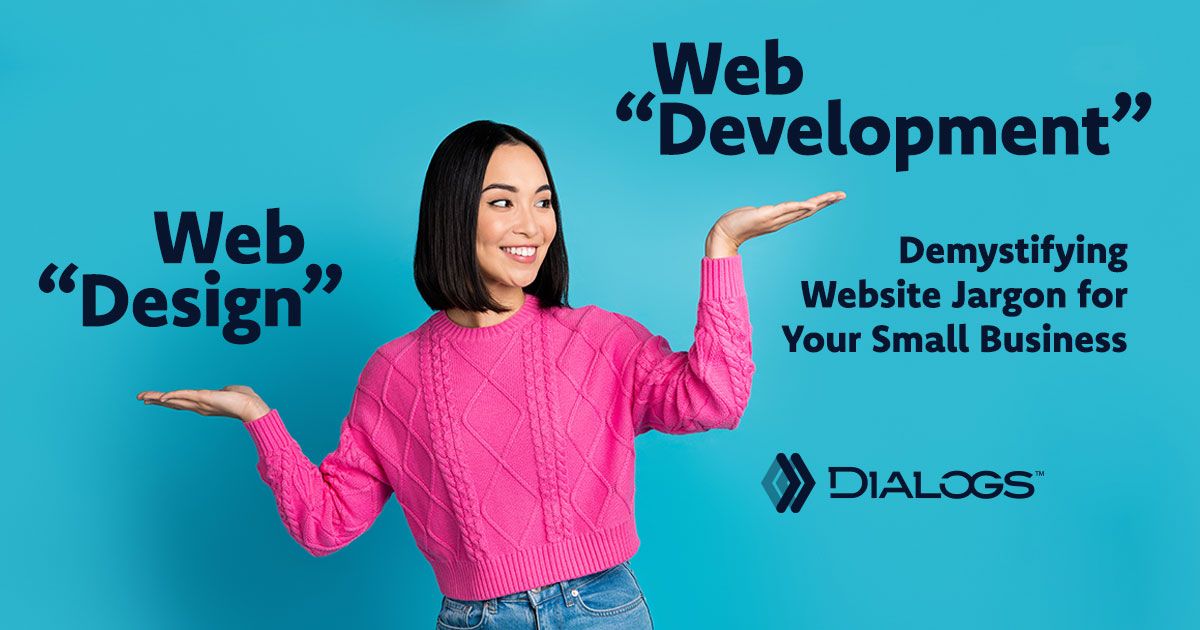
Demystifying Website Jargon: “Design” vs. “Development” for Your Small Business
As you delve into the world of website creation, you might stumble upon some unfamiliar terms: web design and web development. While they sound similar, they address two different aspects of your website. Understanding this distinction is can help you identify the right resources to build a great online presence.
First, these two functions are typically parts of a larger process of building a business website. Here's how Dialogs breaks down those phases:
- Discovery - gaining a consensus of what the website should say and do
- Architecture - planning how the content is organized and what we want the user to do
- Design - creating the look and feel of the pages
- Implementation - translating those designs into browser-friendly code
- Integration - connecting with other systems
- Launch - hyping everyone up about the new experience
- Maintenance - keeping everything current and managing change
The design and development processes happen right there in the middle of the project.
“Web Design”: The Art of Appearance
Think of web design as the visual storefront of your business. A web designer is your creative partner, crafting the look and feel of your website. Their focus areas include:
- User Interface (UI) Design: This involves designing the elements users interact with, like buttons, menus, and layouts. A user-friendly interface is intuitive and easy to navigate, keeping visitors engaged.
- User Experience (UX) Design: Here, the designer prioritizes the user's journey through the website. They manage factors like the flow of information and the organization of content to ensure a smooth and satisfying experience. User Experience is focused on guiding users take certain anticipated steps, such as purchasing a product, signing up for a newsletter, or quickly finding specific information.
- Visual Design: This encompasses the website's aesthetics, including color schemes, typography, and imagery. A web designer creates a visually appealing website that should align with your brand identity.
- Responsive Design: Describes the technical implementation of a website that adapts to different screen sizes (desktop, tablet, mobile).
In simpler terms, a web designer makes your website attractive, informative, and easy to navigate for your target audience.
“Web Development”: The Magic Behind the Scenes
Web development takes the designer's blueprint and transforms it into a functional website. Web developers are the tech wizards who bring your website to life. Their key tasks fall into two main categories:
- “Front-End” Development: This refers to the coding that controls the visual elements users see and interact with in a web browser. Languages like HTML, CSS, and JavaScript are their tools to build the website's framework and ensure a seamless user experience.
- “Back-End” Development: This is the engine room, focusing on the server-side operations that make your website function. Contact forms, databases, e-commerce functionality, and security measures all fall under a back-end developer's purview.
Working Together: A Beautiful Partnership
Web design and development are two sides of the same coin. While designers craft the visual appeal, developers translate that vision into a working website. For a successful small business website, you need both specializations in coordination to create a website that's not only stunning but also efficient and user-friendly.
Many firms and freelancers will market themselves using these terms, sometimes interchangeably. In fact, they may not be wrong to use both terms at the same time! The industry's use of these terms at large has fed the confusion around these two distinct disciplines.
Not to worry! By understanding how these two components fit into the larger website construction process, you're in a great position.
Building Your Dream Website: The Takeaway for Small Businesses
As a small business owner, you certainly don't need to become a design or development pro yourself. However, understanding the distinction between the two will empower you to make informed decisions when building your website.
- Do you need professional help? Consider the size and complexity of your website project and the availability of internal resources.
- What functionalities are essential for your business? E-commerce, booking systems, or simple contact forms will influence development needs.
- How important is a unique brand identity? A strong design focus might be necessary to make your website stand out.
By understanding web design and development, you can more effectively speak the lingo and ensure your online presence reflects not just your brand, but also functions very well.
For more, read our guidance on 3 Crucial Questions You Must Ask When Building A Website.
